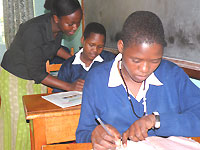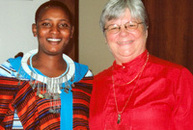Linda Simon was only 14 when one morning, three people knocked on the door of her family home near Arusha, Tanzania.
“I was told to get prepared for the journey to Arusha town, as they are going to take me to a nun who will take me to school. It was a miracle I wished to happen.”

Linda Simon (far l) calls our Emusoi Center “a miracle.” Now she plans to go to medical school.
It could have been different. Many Maasai girls dread that knock on their front door. By Maasai custom, it’s the first time a girl learns of her future husband. An arranged marriage means potential income for the father. But to his daughter, an unfamiliar groom can generate fear and family discord.
Fortunately, Linda was spared the horrors of being married so young. Instead, that day Linda met Maryknoll Sister Mary Vertucci.
Sister Mary coordinates the Emusoi Center, a school she helped found in Arusha, Tanzania. Young Maasai girls like Linda go to Emusoi to get a basic education–and to become young women prepared to study for careers they can use back home. Linda said Emusoi has given her “confidence, happiness and courage.”
“At Emusoi, I met with Maasai girls with different dreams,” Linda said. “Mine has always been that one day, I want to be among the best medical doctors and surgeons in the world.”
Students see Sr. Mary Vertucci (r) as a mentor. Early marriage forces many Maasai girls to forego school.

Linda sees a need for physicians in the Maasai culture and in Tanzania. Unfortunately, however, Linda was the only student in her ward to pass the final exams that led her to where she is today. Having finished advanced studies in physics, chemistry and biology, Linda has her eyes on entering medical school this fall.
According to the United Nations, an estimated 113 million children around the world are prevented from going to school, and 60 percent of them are girls. The reality for many girls is that they’ll be married before they’re 18. In Tanzania, Sister Mary said, no more than 20 percent of primary school graduates continue with their education. The need for education in this part of the world is so great, she said, that more resources are needed.
“At this point, we have more requests from student applicants than we can handle, and we have to send girls away because we have no room or finances to take care of them.”
Before Emusoi, Linda worried that her family couldn’t afford to send her to school. She comes from an “economically poor family,” she said, and Tanzania is among the world’s poorest countries. In 1999, education spending here was under 5 percent of GDP.
“I decided to spend my holiday teaching my young (Maasai) sisters at Emusoi because I know the environment they were brought up in and the challenges they face that some can even complete their primary education without the basic reading and writing skills,” Linda said.
“I believe that my presence will make a difference in their life.”
